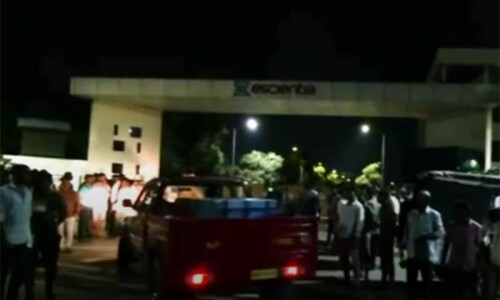KARACHI, Jan 5: The construction of government buildings has been exempted from the mandatory approval of building plans from the Karachi Building Control Authority.
According to sources, a notification SOB (GA&CD) 18 – 219/2008, issued on Dec 31, 2008 under the signature of Sindh chief secretary Fazal-ur-Rehman, says: “In exercise of the powers conferred by Section 1 Sub Section (3) of the Sindh Building Control Ordinance 1979, the government of Sindh is pleased to exclude all government buildings under the purview of the government of Sindh from operation of all the provisions of the ordinance.”
The sources said that this blanket exemption from getting building plans approved from the KBCA – which is mandatory for all other private builders etc – extended to government buildings was unprecedented, though earlier also in a majority of cases government departments did not obtain approval from the KBCA. Earlier, the law, however, required that the buildings plans be approved by the KBCA.
The sources said that the recently announced decision would have a multi-dimensional effect. On the one hand, it would open the floodgates to gross violations of the building bylaws on construction codes, population density, floor restriction, plot to covered area ratio, etc and, on the other, the strength of the buildings would be suspected and it could pose a threat to the lives of the people using government buildings or those residing or moving in the vicinity of these buildings.
The sources said the issue of strength of the government buildings became a subject of national debate after the devastating earthquake that hit the northern parts of the country and Azad Kashmir a few years ago and it was seen that while many buildings and structures had collapsed, an overwhelming majority of government buildings, including the assembly building, the president’s house, prime minister’s house, secretariat, schools, hospitals etc could not sustain the tremors and collapsed, killing thousands of people. Before the government could take any action, the Supreme Court took suo motu notice and called government officials to find out the reasons behind the collapse of government buildings. Lengthy exercises were carried out by the provincial chief secretaries and it was revealed that though present in the law, the government departments rarely – almost never – obtained approval of their building plans from the local municipal authorities. So, the Supreme Court directed that appropriate actions be taken on the issue.
The sources said that following the Supreme Court directive the Sindh chief secretary also carried out extensive exercises to reach the conclusion that the government departments be directed to get their building plans approved from the municipal authorities.
Hence though already required under the law, the then chief secretary – it is a coincidence that Fazal-ur-Rehman held the post at that time also – issued a fresh directive {SO-APPLS-1 (SGA&CD) 24-209/2005 dated Jan 26, 2006} that all government buildings were required to obtain approval of the building plans from the authority nominated under the Sindh Building Control Ordinance 1979. These are exempted from the levy of scrutiny fees only, but the approval of the building plan is mandatory.
The sources said that although the law required, and it was reinforced by the chief secretary’s directive, government departments continued to construct their buildings without getting the plans approved from the KBCA.
A few weeks back Dawn had carried a report about the construction of the Secretariat Tower, right next to the chief secretary’s office, without the KBCA’s mandatory approval and the KBCA also issued a notice to the government to stop the illegal construction. When this reporter approached the chief secretary, he said the construction had been stopped and now it would be resumed after the KBCA’s approval was obtained.
A few weeks later, Dawn reported that the government was carrying out the construction of the secretaries’ flats in Clifton without the mandatory approval from the KBCA, which had also issued a notice to the government to stop the construction and get its approval.
The chief secretary again, responding to Dawn’s queries, assured this reporter that the construction had been stopped and it would be resumed after the approval of the building plans was obtained from the KBCA.
It is, however, unclear why such a blanket exemption has now been given to government buildings.














































Dear visitor, the comments section is undergoing an overhaul and will return soon.